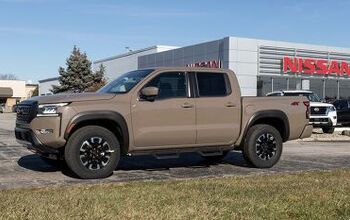May Sales in Japan Weak, Imports Strong

May sales were down in Japan, and this time around, small kei cars could not bail out their bigger brethren. Imports into the allegedly closed market Japan on the other hand are zooming, despite the weaker yen that makes imports more expensive.
Sales of regular cars were down 7.3 percent. It would have been worse without a helping hand from the gaijin. Imports are up 24.8 percent in May after surging 35.5 percent in April. Quite possibly, buyers of imported cars rush to the showrooms before the weaker yen makes the car more expensive. Sales of domestics are down 10.4 percent. This according to data released by the Japan Automobile Dealers Association. Sales through May are down 10.8 percent with imports up 13.2 percent.
Mini vehicle sales Japan May 2013ManufacturerMay ’13May ’12YoYYTD ’13YTD ’12YoYSuzuki46,88947,130-0.5%264,728262,1071.0%Daihatsu51,26655,232-7.2%286,410312,725-8.4%Mitsubishi3,9186,334-38.1%28,04339,968-29.8%Subaru3,9224,712-16.8%24,24241,523-41.6%Honda27,12626,3473.0%179,023131,83535.8%Mazda4,7253,90621.0%24,52123,8612.8%Nissan7,30411,421-36.0%62,22473,914-15.8%Toyota3,3993,496-2.8%17,50516,2817.5%Other03-100.0%519-73.7%Total148,549158,581-6.3%886,701902,233-1.7%Data courtesy Japan Mini Vehicles AssociationSales of minivehicles stopped growing and fell a sympathetic 6.3 percent in May. Kei cars are down 1.7 percent percent for the first five months , the Japan Light Motor Vehicle Association says. Keis hold 40 .4 percent of the Japanese market.
Total vehicle sales Japan May 2013ManufacturerMay ’13May ’12YoYYTD ’13YTD ’12YoYDaihatsu51,43655,457-7.3%287,292313,998-8.5%Hino2,6142,952-11.4%18,55617,5895.5%Honda45,44457,923-21.5%308,093355,948-13.4%Isuzu3,6713,741-1.9%23,56125,147-6.3%Lexus3,3953,1776.9%18,95518,7820.9%Mazda17,72617,0993.7%97,93099,176-1.3%Mitsubishi6,9779,820-29.0%55,16465,975-16.4%Mitsubishi Fuso2,6102,740-4.7%13,58414,767-8.0%Nissan40,52944,348-8.6%291,193309,711-6.0%Subaru13,03210,20427.7%80,26681,445-1.4%Suzuki52,72554,924-4.0%300,061303,575-1.2%Toyota106,134114,210-7.1%658,567738,976-10.9%UD Trucks660765-13.7%3,3353,933-15.2%Other20,69517,58717.7%104,26392,99312.1%Total367,648394,947-6.9%2,260,8202,442,015-7.4%Total vehicles sales are down 6.9 percent.

Bertel Schmitt comes back to journalism after taking a 35 year break in advertising and marketing. He ran and owned advertising agencies in Duesseldorf, Germany, and New York City. Volkswagen A.G. was Bertel's most important corporate account. Schmitt's advertising and marketing career touched many corners of the industry with a special focus on automotive products and services. Since 2004, he lives in Japan and China with his wife <a href="http://www.tomokoandbertel.com"> Tomoko </a>. Bertel Schmitt is a founding board member of the <a href="http://www.offshoresuperseries.com"> Offshore Super Series </a>, an American offshore powerboat racing organization. He is co-owner of the racing team Typhoon.
More by Bertel Schmitt
Latest Car Reviews
Read moreLatest Product Reviews
Read moreRecent Comments
- EBFlex Will I miss the Malibu? No. Will GM miss the Malibu? Absolutely. They are going from making a vehicle that makes money moving 150k a year and converting the plant to make EVs (that nobody wants) at a loss every year and far less volume. The amount of stupid that is always present when it comes to EVs is astounding. The experiment is over GM. Move on
- Mike Beranek In the sedan game, it's now either Camry or Accord. The rest are just background noise.
- Theflyersfan I know their quality score hovers in the Tata range, but of all of the Land Rovers out there, this is the one I'd buy in a nanosecond, if I was in the market for an $80,000 SUV. The looks grew on me when I saw them in person, and maybe it's like the Bronco where the image it presents is of the "you're on safari banging around the bush" look. Granted, 99% of these will never go on anything tougher than a gravel parking lot, but if you wanted to beat one up, it'll take it. Until the first warning light.
- Theflyersfan $125,000 for a special M4. Convinced this car exists solely for press fleets. Bound to be one of those cars that gets every YouTube reviewer, remaining car magazine writer, and car site frothing about it for 2-3 weeks, and then it fades into nothingness. But hopefully they make that color widespread, except on the 7-series. The 7-series doesn't deserve nice things until it looks better.
- Master Baiter I thought we wanted high oil prices to reduce consumption, to save the planet from climate change. Make up your minds, Democrats.


































Comments
Join the conversation
Except BS left out the fact that "imports" doesn't necessarily mean non-Japanese brands as the Japanese automakers import certain models from overseas (for instance, Nissan imports the Micra in substantial nos. from Thailand). Aside from the Germans who have a decent share of the luxury market in Japan, (but still, the Germans do better in Korea which is an overall smaller auto market), there really isn't much by way of foreign mainstream brands doing well in China.